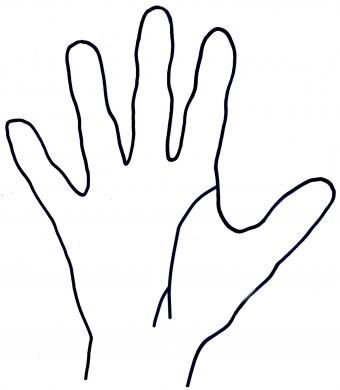
In palmistry, your life line provides information about vitality and energy throughout your life. When reading a life line, palm readers look for length, patterns on the line, forks and intersecting lines, and more. Before we get started with all the info you need for life line interpretation of your own hand, take a look at your palm and get ready to learn a little more about yourself.
Where to Find Your Palmistry Life Line

Created by Lindy Gaskill (C) LoveToKnow, Owned by LoveToKnow Life line on hand
The image above shows you where to find your lifeline. Yours will be in about the same place as in the above image, but it may look different. For example, you may have a forked life line (don't worry, we'll talk about a forked life line meaning in a bit), or you may notice yours has a cross-hatch pattern on it. Yours may also be longer or shorter than the life line in the image.
Still can't find it? Use a magnifying glass or a bright light and look between your thumb and index finger. The line will travel down your palm from there through the middle, curving along the base of your thumb.
What Does a Life Line Mean?
Your life line provides information about your vitality, health, and energy throughout your life, and it may offer insights into periods in your life where you could experience health or energetic imbalances.
If you are right-handed, then reading your right hand indicates things that are happening now and in the future. The left hand indicates patterns you received at birth. If you are left-handed, then the opposite is true.
Related: Palm Line Reading: An Overview
The length of your life line doesn't predict how long you will live — it's a common misconception that it does. Instead, it shows where you may have energetic or health struggles in your life.
Life Line Interpretation Chart
We'll cover various life line interpretations in depth below, but our at-a-glance life line interpretation chart can give you quick information.
| Quick Life Line Interpretation Chart | |
|---|---|
| Absent/no life line | Predisposition to low energy or poor health |
| Faint life line | |
| Close to thumb | |
| Short life line | Lack of grounding |
| Long life line | Generally good health, strength, and vitality |
| Deep life line | |
| Rosy-colored life line | |
| Circles away from thumb | |
| Shallow life line | More mentally focused than physical |
| Thick life line | Tendency to high-energy, physical activity like sports |
| Doubled life line | Physically hearty, resistant to illness |
| Circles the base of the thumb | |
| Wavy life line | Weakened physical condition |
| Broken life line | Periods of illness |
| Broken along bottom | Illness in old age |
| Chained life line | Guided by emotion/emotional events |
| Criss-cross life line | Stops and starts in life |
| Broken life line | Life challenges |
| Downward branches | Periods of poor mental or physical health |
| Upward branches | Resilience, potential for success |
| Forked life line | Redirection or change of life path |
| Trident life line | Good fortune, love of travel |
| Tassel life line | Energetic decline |
| Islands in life line | Interruptions in life path |
Life line traits roughly correspond to predisposed energy, vitality, and health traits. Personal habits and choices affect your energy, health, and vitality, too. While your life line may show certain probabilities, choices and habits will have a huge effect on how well you manage your predispositions.
How to Interpret Your Life Line
Ready to try it on your own? Grab a notebook and a pen and sit somewhere that has good light where you can comfortably rest your palm up.
1. In your notebook, draw a 4-line by 2-column table. Leave plenty of room in each of the squares of the right-hand columns because that's where you'll write your interpretation.
2. In the left-hand table rows, write one of these in each cell:
- 0-20 years
- 21-40 years
- 41-60 years
- 61-80 years
The top half of your life line roughly represents the first 40 years of your life. The second half represents another 40 years. Breaking these two into halves will give you approximately 20-year segments. This is an approximation based on an 80-year lifespan. Yours may be more or less than this.
3. Now, take a look at your hand and locate your life line. Write down all its features and where on your life line they appear, putting them in the appropriate section of your chart. So if you notice an island in the first quarter of your life line, you'd write it in the 0-20 column, and so on.
4. Use the information below to fill in the meanings of each feature in your table.
Depth and Strength of Life Line
The strength of the line and how visible it is offers insights into your overall predisposition to health and vitality.
- A very faint or absent life line suggests you have a predisposition to low energy and poor health throughout your life. If it's faint in one area but stronger in another, note this, too.
- If the life line is long, deep, and has a rosy color, it suggests your physical strength and stamina is good, and you have a general tendency to be in good health with good energy and vitality.
- A shallow but visible life line suggests your tendency is to be more mentally focused than physically focused.
- A deep, thick life line suggests a tendency toward more physical and high-energy activities, such as sports.
- A doubled life line (see image below) that runs parallel to your life line indicates you have a hearty physical and energetic makeup that makes you resistant to illness.

Created by Lindy Gaskill (C) LoveToKnow, Owned by LoveToKnow Double life line
Life Line Travel Around the Thumb
How your lifeline travels around your thumb indicates vitality and physical energy.
- If it swoops outward and circles the base of the thumb toward the middle of the palm, this indicates you have strong energy and vitality.
- If it circles close to the base of the thumb, it may indicate your tendency toward lower physical or emotional energy.
Wavy and Broken Life Lines
Life lines that are broken or wavy are read as a life that may present with frequent and persistent illnesses. Note where on the life line wavy or broken lines appear if its not consistent throughout your life line.
A wavy lifeline may indicate a weakened constitution due to illnesses, circumstances, drug or alcohol addiction, or even imprisonment. A broken line in the last third of the line could indicate declining health in old age.
Chained Life Lines

Created by Lindy Gaskill (C) LoveToKnow, Owned by LoveToKnow Chained life line
Lines that look like they are made up of chain links indicate you tend to be guided by your emotions and may have several major emotional events in your life that affect your energy and health. Chains in some spots but not all will show when these events may occur.
Broken and Crisscross Life Lines

Created by Lindy Gaskill (C) LoveToKnow, Owned by LoveToKnow Broken life line
Whenever a palm reader comes across a life line that's a composite of many crisscrosses, this may indicate a life that has no true direction or many stops and starts. Whatever the cause, a lifeline with continuous breaks may be a difficult life fraught with challenges.
Life Line Branches
Branches extend out from the life line, just like tree branches. They may be a single branch, a double branch (forked), a triple branch (trident), or multiple branches (tassels) in one area. You may need a magnifying glass and bright light to see the branches.

Created by Lindy Gaskill (C) LoveToKnow, Owned by LoveToKnow Branch life line
- Branches sloped downward below the life line indicate the potential for poor physical or mental health.
- Branches sloped upward above the life line indicate resilience and the potential for success.
- Forks in the life line suggest a change or redirection in life energies or a split in energies.

Created by Lindy Gaskill (C) LoveToKnow, Owned by LoveToKnow Fork life line
- Tridents in life lines are signs of good fortune. When they appear at the bottom of the life line, it indicates the desire to travel or a love of travel.

Created by Lindy Gaskill (C) LoveToKnow, Owned by LoveToKnow Trident life line
- Tassels on the life line may indicate energetic decline.

Created by Lindy Gaskill (C) LoveToKnow, Owned by LoveToKnow Tassels on Life Line
Islands on the Life Line

Created by Lindy Gaskill (C) LoveToKnow, Owned by LoveToKnow Island life line
Islands along the life line are small, open circular shapes that interrupt the life line before it continues onward. These typically indicate interruptions in life due to illness or other energetic issues, such as a divorce or a period of depression.
Putting It All Together to Read Your Palmistry Life Line
Your life line can give you interesting information about energetic aspects of your life, including physical, emotional, and mental health during certain periods. As you fill in your chart, you'll be able to get an overall picture of probabilities for 20-year periods of your life. But it's important to remember that possibilities aren't set in stone, and the choices you make can effect whether things happen the way it shows on your palm.







